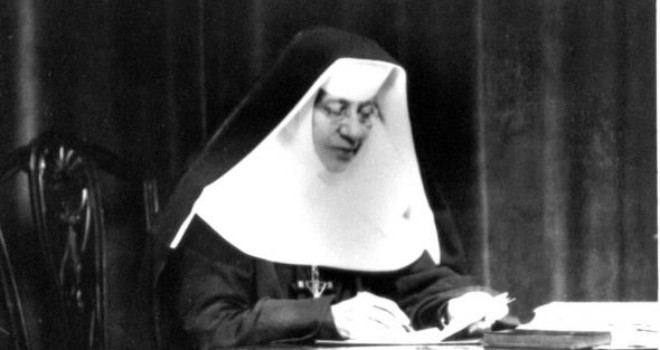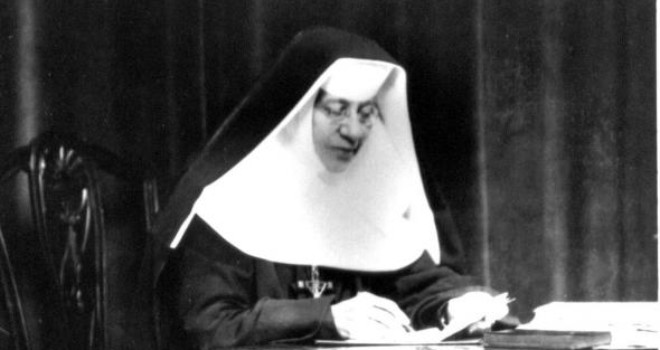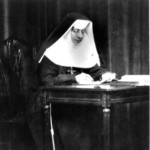A Philadelphia Love Story
The family of St. Katharine Drexel of Walnut Street, in Philadelphia, has a storied history in a city deeply rooted in the American experiment. One cannot but marvel at the manner in which the family was touched by the major figures and events of the 19th and 20th centuries, and then how the Drexel’s influenced history right back in the lives of so many of the “poorest of the poor.” A legacy of charity that continues today through the work of the Sisters of the Blessed Sacrament, that Katharine founded, and, today, in the answered prayers of people like you and me.
A Silver Spoon
The Drexel’s became the premier investment bankers of the nation after Katharine’s grandfather, Francis, issued government bonds that financed the Mexican War in 1848. Later, his apprenticed sons, Frank and Anthony, teamed up with legendary banker J. Pierpont Morgan. Through the extraordinary diligence of Francis’ sons, Drexel, Morgan, & Co. was founded and fortunes were made. Frank and Anthony would later become good friends of not only Ulysses S. Grant, but prominent politicians, statesmen, clerics, and the movers and shakers of industry.
No doubt, Katharine was born with a silver spoon – but not without a price. Her mother, Hanna, died of complications resulting from Katharine’s birth. Less than two years later, her father, Frank would remarry a girl from another storied family, the Bouvier’s. Her name was Emma, and it was Emma who raised Katharine, her slightly older sister, Elizabeth, and little Louise who came along after the marriage. Emma’s grandfather, according to family legend, served under Washington and Rochambeau at Yorktown. Her father, Michel, fought under Napoleon at the Battle of Waterloo. And yes, if the name Bouvier sounds familiar it’s because a century-and-a-half later, Jacqueline Bouvier, a great-great-granddaughter of Michel, would marry John F. Kennedy.
The Love Letter
But the real history of the future saint, even though it starts amidst the trappings of wealth and privilege is hardly explained by it. The little Drexel family of Frank and Emma, and the children, Elizabeth, Katharine, and Louise paint a portrait far removed from the gilded age etched into America’s consciousness, of iron and coal barons, oil and rail magnates, and financial tycoons who dominated America’s economic and social history after the onslaught of the Industrial Revolution tore down the fabric of the Jeffersonian ideal of an agrarian utopia. In fact, rather than defining the age, the Drexel family defied it.
Sure, the three Drexel sisters, if one looks at a photograph of them, appear to be almost like play dolls dressed in soft satin and frilly lace. But, that’s only on the outside. Inside the home on Walnut Street one would see a beautiful mosaic of humility and charity developing in the hearts of the children. This is a direct result of the love shared by Frank and Emma and is perfectly made clear by a letter written by Frank to Emma on New Year’s Day, 1863. Please read the following carefully. Appreciate the Victorian Age in which it was written and see through its rigid formality. Get into the weeds, read between the lines, understand the intense and passionate commitment to wedding vows long since taken, and how that is communicated so deftly:
My dear and affectionate wife: It is well at the beginning of another year to give expression to the thoughts that have been active in the mind during the one just gone by, as well as to form resolutions which may govern us in the one to come.
Many various blessings have been conferred upon us the time we have been united – a special Providence it has been that brought us together, and if we operate according to its designs it will be the means of amending much in us that needs correction.
A similarity in feeling and disposition unless regulated by mutual love and forbearance, does not in general produce perfect accord – what each of us offends in we are less liable to forgive in the other – mutual forbearance is necessary for both of us and for my part I feel that you have shown it toward me in a greater degree than I have returned it. Had I performed my religious duties with more seriousness and attention I should probably not now stand self-convicted.
We have received many and various blessings. Let us not be forgetful of them but in the time to come may we show by our punctuality in approaching the Blessed Sacrament and the attention and devotion that we manifest in preparing for it, that we appreciate the means of salvation which have been designed to sustain our spiritual life. May our hearts be continually directed towards Him who suffered and died for us and gave us His flesh for our life – when tempted let us instantly call on our Blessed Mother – she is our friend and helps us. God has also bestowed on us abundance. Continue your charities in His name. Be the dispenser of His gifts and let us also extend the charity of thought towards others who offend us.
In conclusion my dear, dear one, let me wish you a happy New Year indeed, a strength to bear all the little trials that may befall you. May your warm, tender, loving heart beat yet more tenderly toward your own loving and affectionate husband, pardoning him his faults and sustaining him in his trials, and thus make home a heaven here below.
Think of how such an aura of love and faith must have permeated the modest home on Walnut Street. And, it was modest, considering the vast sums Frank had under his control. They could have lived in a castle, they didn’t. What effect would such an atmosphere of undivided love have on the three girls? The abundance Frank speaks of is not recognized as his own, but as “His gifts.” This is truly a call not just to stewardship, but to discipleship itself.
And, now, let’s put it into context. The United States was in the middle of a devastating Civil War. Most of the victories had been rightfully claimed by the Confederate forces commanded by the master tactician, Robert E. Lee. The threat to the North of invasion was very much in the minds of leaders like Frank Drexel, who were called to finance the war. Yet, Frank doesn’t mention any of these things in his letter. His mind and his heart are concerned with something more important – like eternity – how to earn salvation through charity.
Go Fish
Emma’s charity saw no limits. Three times a week, the needy would come to the Drexel home on Walnut Street for shoes, clothing, rent assistance, even burial money. Orphans were provided for, the sick would be given medical care, and each of these gifts of mercy was well documented so that fraud and abuse were kept to a minimum and the truly needy were comforted. The girls were encouraged to participate in the ministry, but using only their own allowance.
Was this largesse just an American twist on “Noblesse Oblige” (Obligation of Nobility)? Did the Drexel family believe as steel magnate Andrew Carnegie did in the Gospel of Wealth, where the new found rich were obligated to give back to society but only under the stern dictates of the “survival of the fittest”?
The answer is definitely not. And there is no subtle difference here. Philanthropic altruism – you know, the macro-idea of planned giving versus the micro-act of charitable virtue, are, truly, light years apart. To me, the asinine analogy of giving someone a fish as opposed to teaching him how to fish is, well asinine. If someone is hungry give them the fish, and then get to know them, personally, and then and only then – teach them how to fish. Not from a mountain top of insurmountable wealth but in the trenches where both the needy and the fish happen to be. As noble as the recent efforts of Bill Gates and Warren Buffett are in what has become known as “The Giving Pledge,” where the billionaires promise to give half of their fortune during life or after death to accomplish good deeds, what exactly, besides money, is being given, and for what purpose? Is this the virtue of charity?
No. What the three Drexel girls were taught was to get their hands dirty by personally involving themselves with the “great unwashed,” the oppressed, the downtrodden, and walking in their shoes. This is charity. This is what St. Francis would do.
Elizabeth and Louis were not called to the religious life, their vocations were elsewhere, yet they lived virtuous lives and were dedicated to the poor. This is why Frank and Emma, I believe, were saints, even before the crown was given to Katharine. Because from the seeds they planted by their own love story, extraordinary blossoms burst forth in the lives of their children who, according to God’s will, had no children of their own, but, miraculously, became real mothers to the tens-of-thousands of African and Native American people they served.
(Author’s note: many thanks to Lou Baldwin, author of Saint Katharine Drexel: Apostle of the Oppressed, 2000, The Catholic Standard and Times, for an inspiring biography and resource material).












